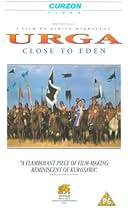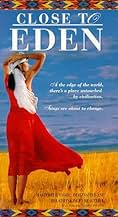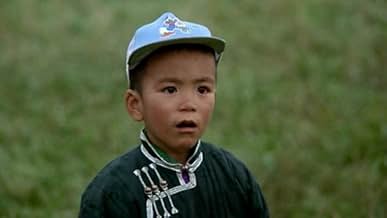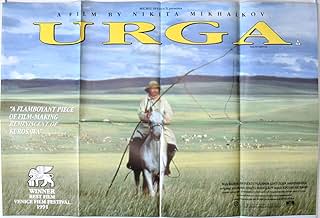IMDb रेटिंग
7.5/10
4 हज़ार
आपकी रेटिंग
अपनी भाषा में प्लॉट जोड़ेंA curious friendship develops between Gombo, a young Mongolian shepherd living with his wife and family in a hut, deep in the wilderness of the steppes, and Sergei, a Russian worker whose tr... सभी पढ़ेंA curious friendship develops between Gombo, a young Mongolian shepherd living with his wife and family in a hut, deep in the wilderness of the steppes, and Sergei, a Russian worker whose truck breaks down not far from Gombo's hut.A curious friendship develops between Gombo, a young Mongolian shepherd living with his wife and family in a hut, deep in the wilderness of the steppes, and Sergei, a Russian worker whose truck breaks down not far from Gombo's hut.
- 1 ऑस्कर के लिए नामांकित
- 5 जीत और कुल 12 नामांकन
Nikolay Vashchilin
- Nikolai
- (as Nikolai Vachtchiline)
Larisa Kuznetsova
- Marina
- (as Larisa Kuwnetsova)
Nikita Mikhalkov
- Bicycle rider
- (बिना क्रेडिट के)
फ़ीचर्ड समीक्षाएं
Urga is an excellent example of the magic of film in allowing people of very different cultures to communicate their various realities and common humanity. To someone like myself coming from a "modern developed culture", I found this tale of a culture that has only recently experienced the impact of "western" society, an entrancing and wonderful experience. It is visually beautiful, frequently wildly funny and life-affirming. For an unusual and extremely accessible film experience - or as a primer for the intending visitor - Urga can be heartily recommended.
One of the best films I know: beautiful, pensive, playful, realistic, poetic, humane, up-lifting. In the barrage of trash, one of the few films that makes me believe in humanity. I love this film so much that I arranged home projections for my friends several times. With all the up beat that I am mentioning, it is very open and truthful. Where in an American movie could you see an on-screen slaughter of a real lamb? And it was not ugly or gory at all! On the contrary, it was very decent and sensitive, teaching us respect for Nature.
And another little point. Has anybody noticed the inconspicuous little voice-over at the end which essentially makes "Urga" science fiction?!
And another little point. Has anybody noticed the inconspicuous little voice-over at the end which essentially makes "Urga" science fiction?!
If you ever wondered how an ordinary life could have been like without constant bombardment of television, ads and all the trappings of a hierarchical society, this movie beautifully depicts the life such a family, in the process of being unconsciously absorbed by the modernity the rest of us are so familiar with. The lead guy's performance as he tries to bemusedly make sense of the city and its services and warez is very touching. Its sad to see a strong, capable, independent soul finely tuned to the nature he is part of being slowly displaced by the "greater" civilisation, but its also an uplifting narrative of escapisim to a place where the contradictions and pretensions of the organised society does not exist.
10Fafouin
I had to embrace my aunt after seeing this movie for having brought me to see it. The images are beautiful and the relationships are, at times, complex but always touching. Never have I experienced a filmmaker able to capture the beautiful humanity of each of his characters and their gestures. This film is a treasure and quite possibly my favorite film of all time.
The best definition I can give to movies I greatly admire is that they take me someplace I don't expect to go.
It can be a special location. It can be a special moment. It can be a special revelation.
Close to Eden, as this movie has been titled in the United States, offers the entire combination. A 1992 Russian nominee for the Oscar for Best Foreign Language Film, the movie opens on the vast grassy expanses of the steppes of Mongolia, where the setting initially is evocative of a certain timelessness. The historical instant cannot be ascertained confidently, even within an error margin of a few centuries. Nor do we know what the movie designs ultimately to tell us.
Such uncertainty begins to give way as a vehicle and visitor enter the scene and are involved in a mishap that results from first sleepiness and then fright. The nature of the vehicle and visitor narrow the reference era to an accuracy level of mere decades. From there, the plot leads to a likable nuclear family of herders, to which a grandmother is attached. We follow their story and soon learn when, among the vast expanses of time, it occurs.
The theme here is subtly...ecological...in three parts. The first part concerns the lifestyle of the family, and its self-sufficiency. The second part concerns the travel the father undertakes, and the reason for the travel, an assigned errand he seeks to accomplish in the course of that journey. The third part concerns the conclusion, where the issue of time again intervenes. There is in fact no timelessness, but rather its passage. The narrator in A River Runs Through It is "haunted by waters." Similarly, the ending of Close to Eden is haunted by grasses. Its status as one of the great foreign films arrives in the last few knockout minutes.
It can be a special location. It can be a special moment. It can be a special revelation.
Close to Eden, as this movie has been titled in the United States, offers the entire combination. A 1992 Russian nominee for the Oscar for Best Foreign Language Film, the movie opens on the vast grassy expanses of the steppes of Mongolia, where the setting initially is evocative of a certain timelessness. The historical instant cannot be ascertained confidently, even within an error margin of a few centuries. Nor do we know what the movie designs ultimately to tell us.
Such uncertainty begins to give way as a vehicle and visitor enter the scene and are involved in a mishap that results from first sleepiness and then fright. The nature of the vehicle and visitor narrow the reference era to an accuracy level of mere decades. From there, the plot leads to a likable nuclear family of herders, to which a grandmother is attached. We follow their story and soon learn when, among the vast expanses of time, it occurs.
The theme here is subtly...ecological...in three parts. The first part concerns the lifestyle of the family, and its self-sufficiency. The second part concerns the travel the father undertakes, and the reason for the travel, an assigned errand he seeks to accomplish in the course of that journey. The third part concerns the conclusion, where the issue of time again intervenes. There is in fact no timelessness, but rather its passage. The narrator in A River Runs Through It is "haunted by waters." Similarly, the ending of Close to Eden is haunted by grasses. Its status as one of the great foreign films arrives in the last few knockout minutes.
क्या आपको पता है
- ट्रिवियाThis was the first film nominated for an Academy Award for Best Foreign Language Film from Russia. Previous nominees from that country had been submitted from The Soviet Union. It lost to France's Indochine (1992).
टॉप पसंद
रेटिंग देने के लिए साइन-इन करें और वैयक्तिकृत सुझावों के लिए वॉचलिस्ट करें
- How long is Close to Eden?Alexa द्वारा संचालित
विवरण
बॉक्स ऑफ़िस
- US और कनाडा में सकल
- $3,77,832
- दुनिया भर में सकल
- $3,77,832
- चलने की अवधि1 घंटा 59 मिनट
- रंग
- पक्ष अनुपात
- 1.85 : 1
इस पेज में योगदान दें
किसी बदलाव का सुझाव दें या अनुपलब्ध कॉन्टेंट जोड़ें

























